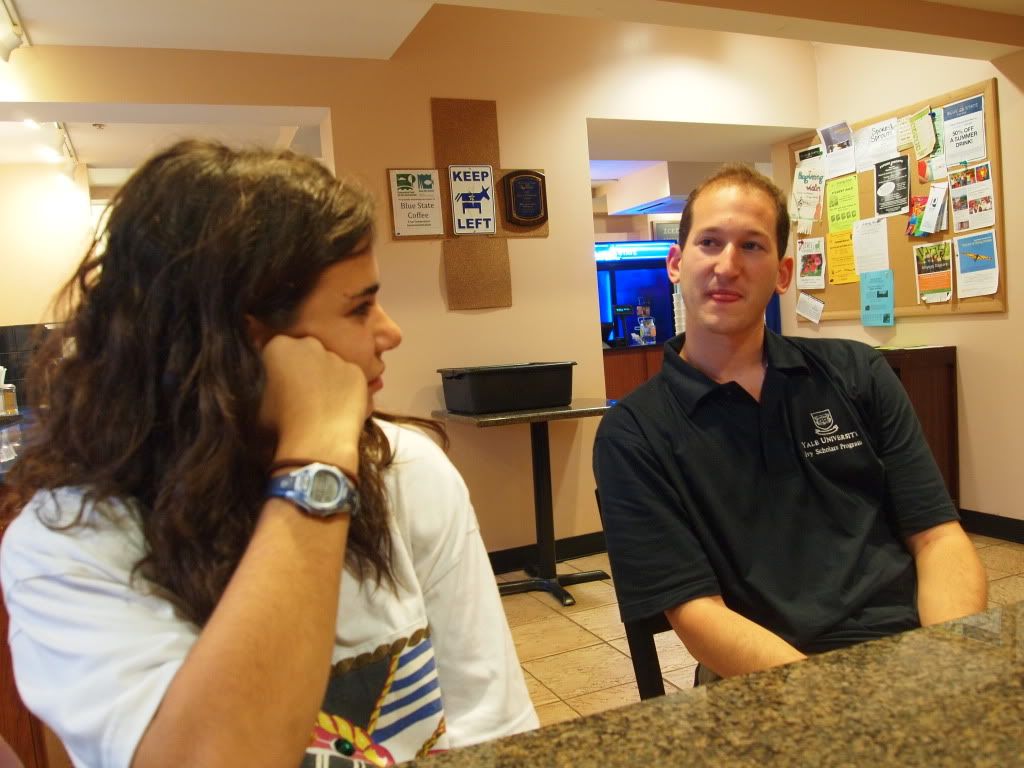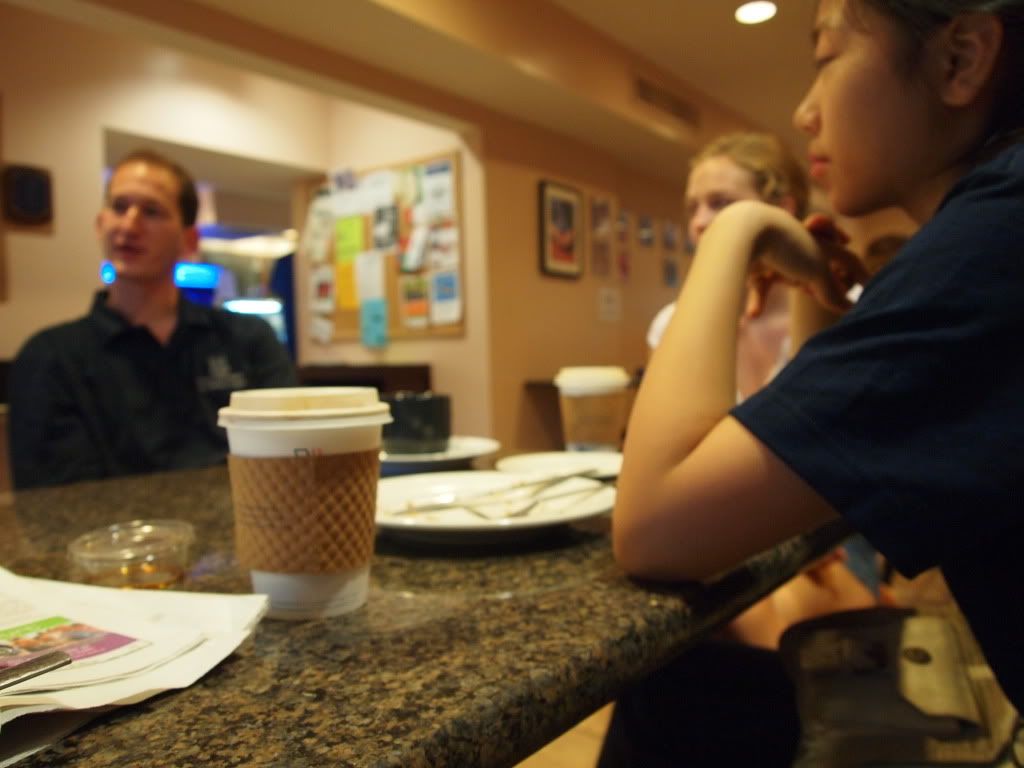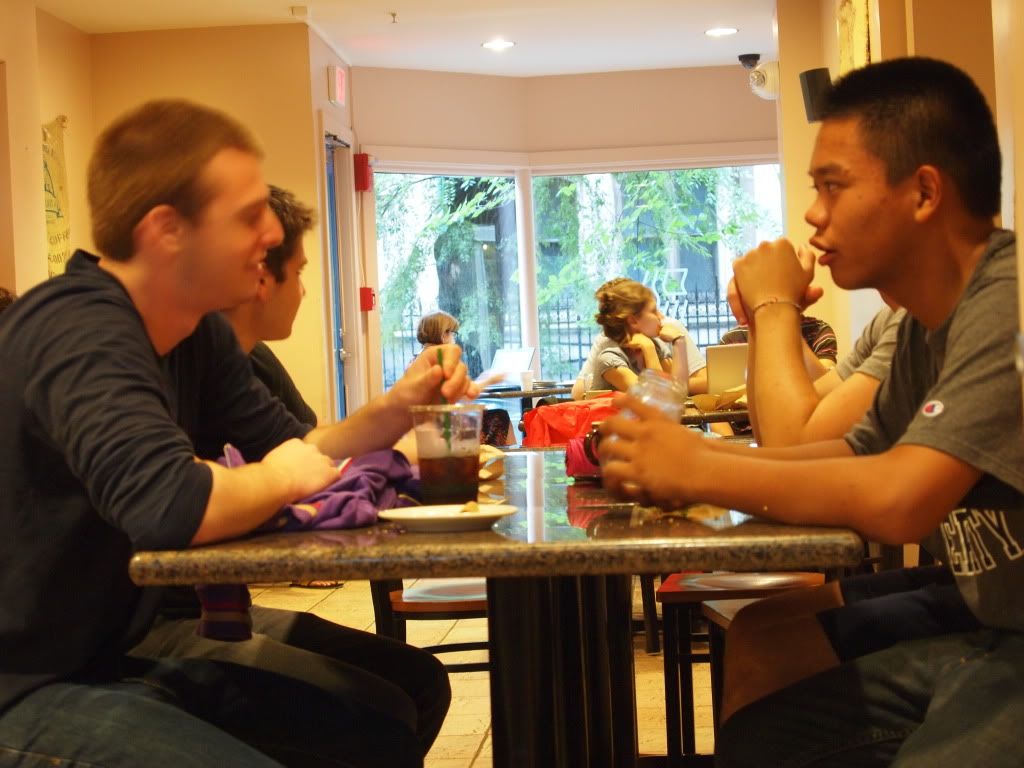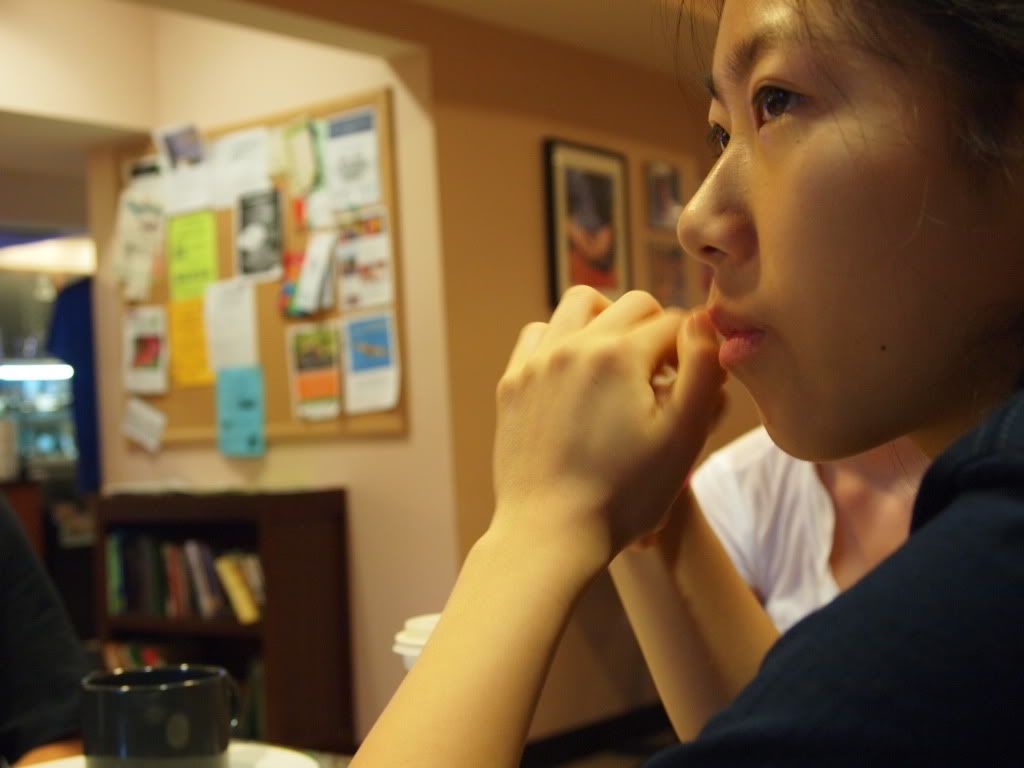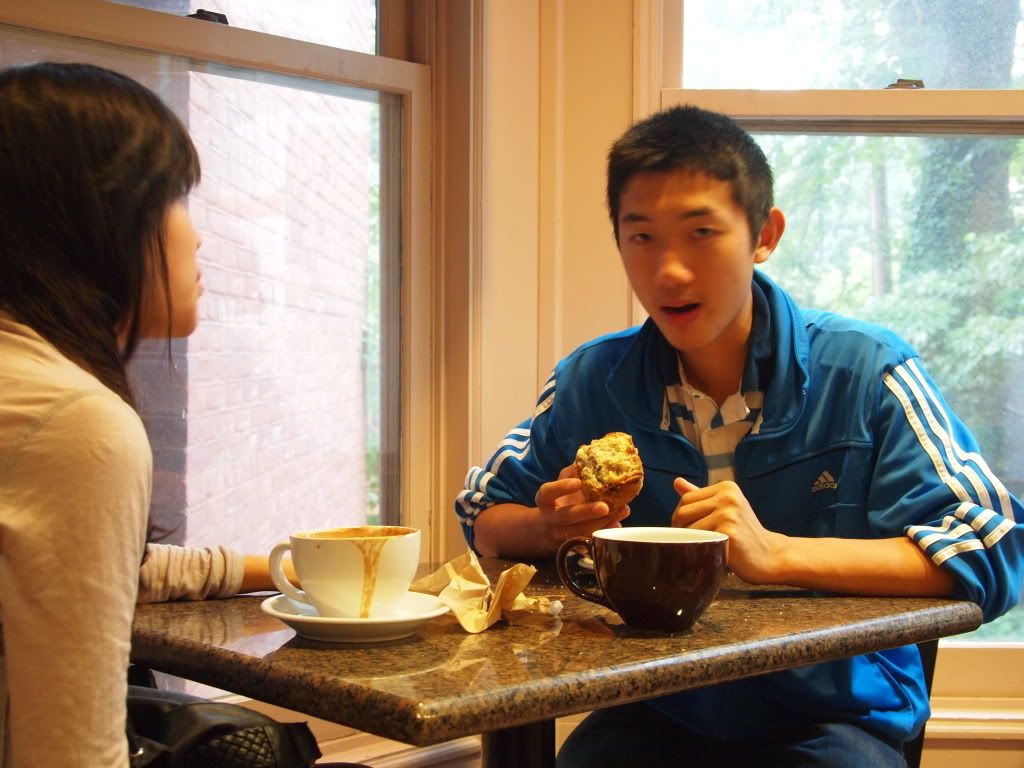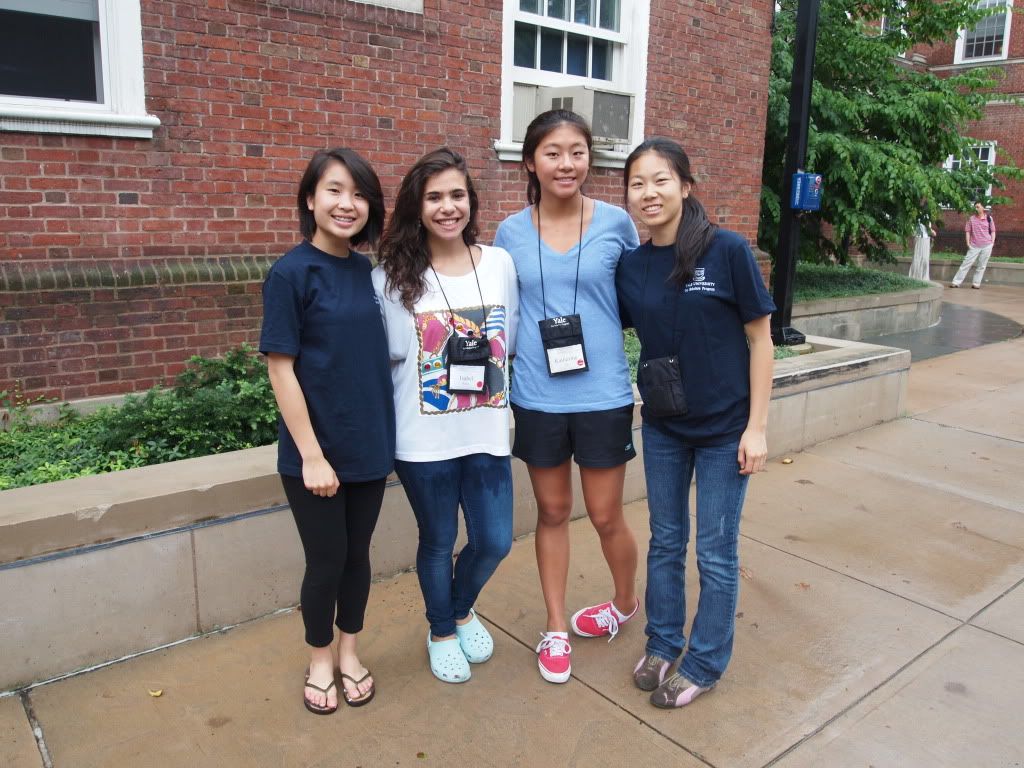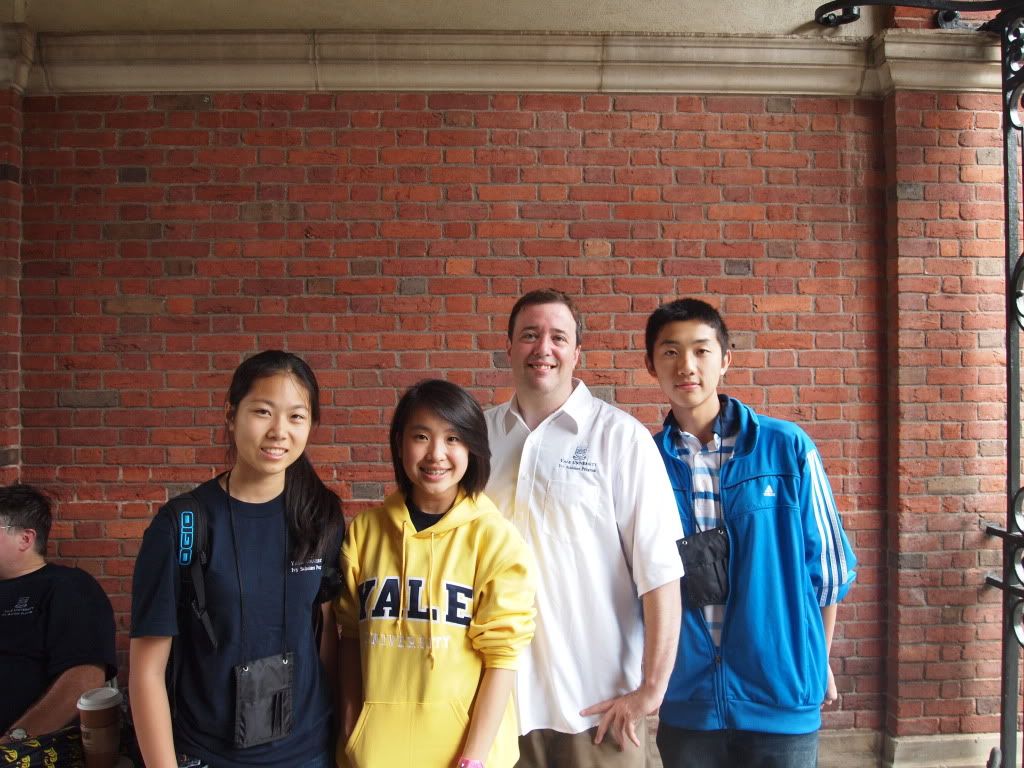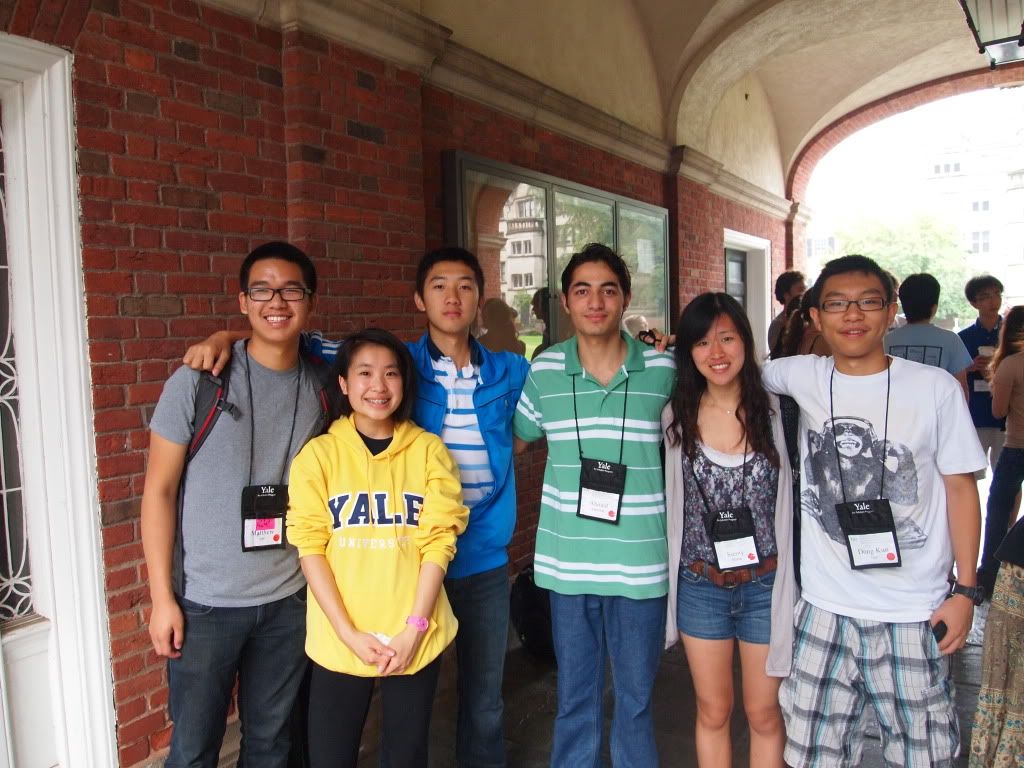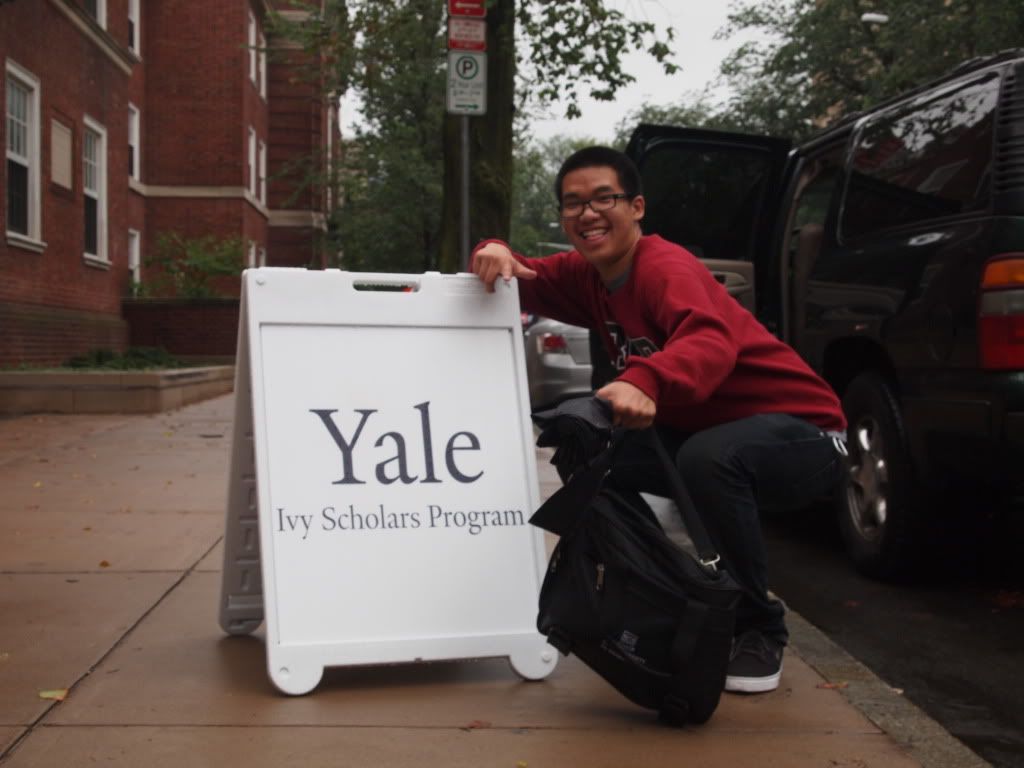Wednesday, August 10, 2011
"We Few, We Happy Few, We Band of Brothers"
Tide Embraced: Reflection of the YISP Experience
Remember the tide?
Prior to boarding the plane and prior to everything I was to experience in the East Coast, I envisioned an incoming tide and myself an amateur surfer. I didn’t know what I was getting myself into entirely. I kept an optimistic and brave front most of the time, even though the fear of not meeting expectations or making a fool of myself were common nightmares I’d let surface now and again. This was how I’ve always carried myself despite the ultimate coward I was capable of being internally. I envisioned myself coming out successfully in the end as much as I imagined myself undergoing all possible routes of failure. In the end, was I going to become plankton in the big ocean, or an obnoxiously large whale in an elementary school drinking fountain?
I was a participant of Yale Ivy Scholars for the summer of 2011. I was among 72 students this year, all studying under the “Grand Strategy” course. Before I started this program, I admit that I had a hard time explaining what this program was really about. Now, I can say with more confidence, just what “Grand Strategy” really is. Being a “Grand Strategist” is a never-ending climb, not to perfection, but a climb for the sake of climbing. You’re constantly learning and curious. You’re always trying to solve the problems before you by using the best method you think is possible. You never stop asking yourself: “If I was in his/her shoes, how would I have handled it?” You are a leader striving for effectiveness and understanding; you shun power and personal rewards.
Simply saying that I learned a lot from these past fifteen days would be an understatement. Rather than bore all of you with lengthy recollections of what I learned during lecture, however, I will share with you some of the most important things I’ve come to realize and now, fully abide by.
Spending Time with People Smarter Than You
You feel a mixture of inspiration, jealousy, and intimidation whenever you hear any one of them admit to their past achievements and accomplishments. I may not know every detail about my fellow peers, but never once have I heard them admit to any of these without being humble or somewhat shy about their successes. One of them was nationally ranked 19th as a policy debater, while another can claim they’ve sat on the British parliament for simulation. Some of them never bothered to share their achievements, but their reservoir of knowledge – displayed throughout lectures or casual conversations – was obvious. Everyone around me was exceptional, one way or the other. I didn’t get the feeling that they paid their way through alone; they all deserved to be there. Many fearlessly participated and spoke their mind during lectures and seminars – you’d rarely see this in my high school. And if they were not as outspoken as the aforementioned group before, they were surely talented in other ways – especially in writing.
The talents among them were endless; in addition to their intellect, there was a handful that could also sing, dance, draw, and/or play sports, just as skillfully. There is really no way to rank these people. You easily feel subordinated. Yet, despite constant exposure to these brilliant beings, I still, remarkably, had room for personal pride. Many of my fellow peers were a lot stronger than I was, in a variety of areas, and I was not the least bit surprised. However, the yearning to be like them subsides when you realize that you’re imperfect and cannot expect yourself to be like everyone who inspires you. Instead, you accept that you’re not nationally ranked 19th for policy debate; you indulge in the exceptional company before you and be thankful for all the unique qualities that make you, you.
The Meaning of Great Education
Everyone that’s been there tells me that college education is wonderful. If in high school you didn’t feel particularly satisfied, than college education would fulfill that void, or so I’ve been told. At YISP, the education that was promised was delivered. All the guest lecturers that graced their presence before us inspired and amazed me to no end. There are some undergraduate students, even graduate students, who’d want to sit in one of our seats for during some of these lectures. Four to five students alone, as Dr. Luong told us, wanted each of our spots based on the total number of applicants this year.
In addition to the extensive topics covered during seminars and lectures, I especially liked that this program avoided a grading system. And yet, even without grades to act as incentives among us, no one took advantage of them to avoid class. It was learning for learning’s sake – not even the best private secondary schools in the country could boast these high percentages of mutual attitude within a classroom. Granted, levels of attention varied from lecture to lecture, but generally, everyone tenaciously stuck with the heavy workload expected from our everyday schedules. In addition to the breadth of renowned teachers we had giving us lectures, it was also an honor to sit with such driven and intelligent group of students. Every day, they’d bring to lectures their own knowledge and ask questions I haven’t even thought about. They fearlessly stand by their opinions, unafraid to meet those who challenge them in the eye. Some may stutter to attempt a rebuttal, but they’d never sit down in hopeless defeat. They’re not always right and their questions may not always be the smartest, but all of them share ruthless courage.
Back at Pinole Valley, I sometimes feel ashamed to hog class time with my questions, especially when none of my fellow classmates seem to show any interest in asking questions of their own. Many students within our lectures never ask questions too, but that doesn’t stop the rest of them from asking questions when they really had one. These lectures always devote an hour in the end for questions and answers; I’m going to miss seeing a forest of raised arms when I start senior year at Pinole Valley.
No Longer The Top (Accepting The Inevitable and Moving On)
When I was much younger – when I boldly thought the world was a lot smaller than everyone thought it wasn’t – I used to believe I could, or would, eventually become the best at [fill in the blank here]. I was so competitive; I hated admitting to defeat. This attitude served me well during my early youth, when my fellow peers were more interested in playtime or naps then fretting over being number one all the time. Only I was crazily obsessed with ambition (to this day, I am baffled by where it all came from).
As I grew older, however – moving from fish bowl to aquarium – I ran into defeat and rejection more frequently alongside occasional moments of triumph. The first time – okay, the first several times – they hit me really hard. Physically, I never harmed myself, but emotionally, I felt sharp stings. I was so uncomfortable with defeat. I scolded myself for not living up to expectations. At every downfall, I felt like “the magic” was rubbing off. What was wrong with me? What was I doing wrong? Eventually, and thankfully before this program, I realized that there really wasn’t anything wrong with me and that I didn’t do anything wrong. It was life.
I cannot expect to be the best at everything; there will always be someone better in some degree. Being at YISP this year, strengthened that lesson. Most of the 71 students around me were just as, if not equally as, ambitious as I was. I could’ve strained myself to an extent to beat all of them (though I highly doubt it), but that would be such a waste of my experience. You risk your potential to get the best from an experience like the YISP by being close-minded and treating all those around you as threats to your spot at the top. Sure, proving yourself to be one of the best among this pool of students would have surely been something to boast about in the end, but weren’t all 72 of us chosen for a reason? There will never be an adequate apparatus to measure success and capability; they will always be weighed and scaled through personal opinions. In my opinion, everyone YISP Grand Strategy was already at “the top”. I did not receive any special awards in the end, just the same certificate of completion that everybody else received. Yet, I’m not bothered at all. Indefinitely it would thrill me to return home to Pinole, CA to wave two certificates in my hand, but I’m perfectly content with the one I got already.
The expectations I try to fulfill are solely my own now. I take those of others into serious consideration, but in the end, I make sure I satisfy my own desires first. “Are you happy?” I’d ask myself. Even if I honestly replied that I was somewhat disappointed, I remind myself that there was always a brighter side to things and that tomorrow was a clean slate. It’s not because I’ve lowered my own expectations of myself or that I was pulling myself away from competition. I continue to set extremely high goals and refuse to give up without a good fight. For me, lingering in the past and beating myself over errors was counterproductive and a distraction from moving forward.
To pick up from your mistakes and move forward, ask yourself what it is that you can do to avoid the same error in the future, not screaming impossible questions to yourself, like "Why can't you do anything right, for once?!" I certainly didn’t leave YISP as one of the “top” students (if we’re really considering any form of rank here) and I do not consider myself less of a person. I gave my best effort – arguably, I should’ve been a bit more confident in putting myself out there – and I can’t expect something that I couldn’t deliver. Being able to consider myself an Ivy Scholar is a big deal to me. It makes me proud.
The Importance of Knowing the World Around You
If you do not already read newspapers and/or watch the news as close as you can get to daily routine now, I highly suggest you start. The modern world we live in offers no excuse for anyone to continue going about life without taking the time to check up with current events. The entire faculty at YISP either stresses this and/or engages in this routine as if the day would be incomplete without it.
I used to make up some excuse – like how busy I always was – to make me think this jagged faith to the world around me was okay. It is not. Now, I see this as a poor excuse. If you can’t find time, you make time. Different news articles have different effects on the individual but you’re not being asked to become an expert on the world. You just have to be aware.
I am reminded of Mr. Paul Solmon as I write this. He covers the economics portion of PBS NewsHour and I look up to him highly. For Mr. Solmon, he is concerned that by the increasing number of Americans – especially young adults – who know so little about the economy. It’s extra knowledge that could only help and better your future in the long run. Don’t let the need to catch up with old news stop you from reading current news. Go forth and be knowledgeable. Having an interest in the present means you show an earnest care for the future.
Teamwork
My Marshall Brief group was told that we had the hardest topic among the rest. Later, the whole groups expressed that they heard similar comments. Whether Mr. James “Jeb” Benkowski – our Marshall Brief advisor – was trying to inflate our discouraged and frustrated heads or not, our group were guinea pigs to an “experiment” Marshall Brief topic. Our topic – “International Action for the Korean Peninsula (PRC)” – was the first Marshall Brief the YISP attempted to do under the perspective of another country. In addition to learning as much we could about the DPRK, our group also had to adjust our thinking so that every policy we wanted to implement was something the PRC, not the US, would do.
My Marshall Brief consisted of four girls in total, including myself. Not only were we one of the smaller groups (the average was five or six); we were also the only all-girl group. Among each other, we constantly joke just how horrible this combination was. A grouping of equally driven girls working together – are you looking for trouble? Perhaps. But the four of us worked – pardon my French here – our asses off to be prepared for our presentation in the end. Yes, it took us much longer to choose what it was exactly that we wanted to do with our topic. Yes, we missed some deadlines by minutes. Yes, we’ve pulled all-nighters to stay on top of things. And yes, we sometimes skipped delicious meals at the Silliman Dining Hall.
Some groups had one or two individual that rose to take charge while others had too many taking charge, thereby jeopardizing progress. In our group, any one of us could’ve taken charge, but instead, we all took equal, dual roles as leader and follower. There was no finely drawn line in terms of our individual responsibilities. No one really assigned things; we all determined whether the duty at hand measured equally with the weight the others were pulling. Looking back at it all now, I can see how this method was both a good and a bad thing.
I honestly have yet to figure out what the ideal method of teamwork is among a group of leaders. I can tell you what a leader should do in a team, but when it comes to leaders leading amongst each other, I am still a bit lost. However, I do know that it is possible. I also know that when leaders do work well with one another, some of the best work imaginable results. The astounding Marshall Briefs each group produced only after a couple of days work is proof.
My Marshall Brief group’s teamwork was not perfect but how well we performed during our presentation capped any remaining frustrations we had in a bottle and was tossed out to sea. Our Marshall Brief did not win any awards, but none of us complained. The hard work we all put in, obvious by our tremendous reaction once it was all over, was incredible. Even though we didn’t end up as “the best Marshall Brief”, I’d trade good teamwork and harmony over winning such a title under an imbalanced and constantly bickering regime.
Life-long Friends
There was so much work to do during these fifteen days that simply attempting to squeeze an adequate social life would loosen the fragile, delicate fabric of progress. Yet, despite all the opportunities that this schedule gave for all 72 of us to become lone wolves, nearly everyone rejected that wonderful option.
It seemed as if the more lectures and challenges we were constantly being thrown at by the faculty, the more prone we all were to support and confide with one another. With similar work ethics and sense of independence, many of us, remarkably, found it all the more easily to establish close bonds. These friendships are some of the strongest and most unique bonds I’ve made for such a short period of time. There was a mutual understanding of the struggles and frustrations we felt from the work put before us – like a language we developed among one another.
The girls I shared a suite with always brought a smile to my face, even though I often returned to our dorms with Marshall Brief work that extended across the night and into early morning. Everyone understood the need for quiet time to concentrate; they respected everyone’s need to work instead of joining the circle of latest gossip. By the time this program came to an end, I surprised myself with misty eyes. I feel very blessed that I had the chance to call these incredible people my friends.
- - - - -
To revisit the concept of the aforementioned tide, I’ve come to realize that I wasn’t an amateur surfer at all. If I had to provide a more accurate analogy, it be much more appropriate to say that I am like a baby turtle, freshly hatched from my egg. Unlike the surfer and more like the turtle, I am not alone on the sand. There are a bunch of other baby turtles, just like myself, struggling to reach the tide.
Through the eyes of man, the distance is only several paces – such an effortless task. For these baby turtles it’s a journey of life and death. Looking back at the entirety of summer vacation, YISP looks like several paces but it really was a long, challenging journey. Just like these baby turtles, making their way across the sand, the Yale Ivy Scholars of Grand Strategy braved through these fifteen days. Some moved faster than others; some dodged several seagull attacks. In the end, though, we all made it safely into the tide.
The tide was good all along. When you see yourself as a surfer – so caught up in yourself and what it is that you want to accomplish – you’re so anxious to worry about the outcome and not the actual process to reach that outcome. As an amateur surfer, I worried about whether the tide would bring success or failure; I didn’t even consider whether I’d even reach the tide or not. I was so caught up with the conclusion, I forgot about the climb I had yet to even start.
The tide was good all along. As one of the 72 baby turtles slowly sifting through the sand, it was completing the journey on time and as safely as possible that ranked as our number one priority. Baby turtles do not spend their first moments out of their shells, casually daydreaming what the ocean was like. For them, it was work first, reward later. Just like these hardworking baby turtles, that was how everyone at Ivy Scholars viewed these fifteen days. We couldn’t wait to experience that happiness that all our accumulated hard work would eventually come to highlight, but before we could have happiness over our accomplishments, we needed the hard work.
All of us made it to the tide in the end. The strength of the current could no longer keep us together, as it yanked each of us to individually different directions. Although the final destination of these hardworking baby turtles remains a mystery, all of them are bound for something big within that endless ocean. Their struggle across the sand does not guarantee their success, but their incredible ability to defy their slim chances for survival have turned all of them into toughened turtles, ready to face whatever obstacles comes their way. With hope, some of these turtles may cross currents one day, but then again, they may not. These turtles will never forget their journey across the sand, greeting a tide that was good, exceptionally good, all along.
by Dyana W. T. So
Encore!
